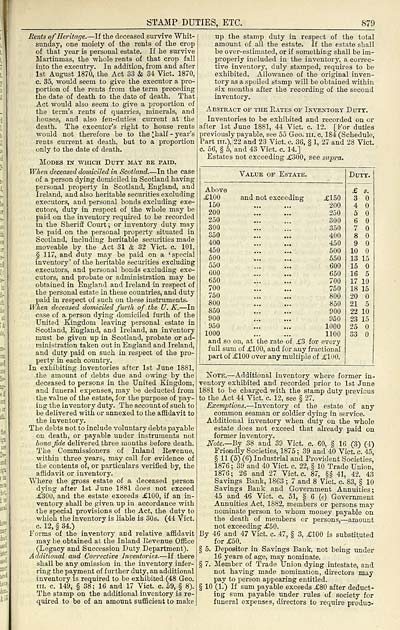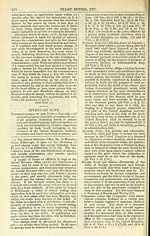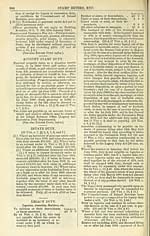Download files
Complete book:
Individual page:
Thumbnail gallery: Grid view | List view

STAMP DUTIES, ETC.
879
Rents of Heritage. — If the deceased survive Whit-
sunday, one moiety of the rents of the crop
of that year is personal estate. If he survive
Martinmas, the -whole rents of that crop fall
into the executry. In addition, from and after
1st August 1870, the Act 33 & 34 Vict. 1870,
c. 35, would seem to give the executor a pro-
portion of the rents from the term preceding
the date of death to the date of death. That
Act would also seem to give a proportion of
the term's rents of quarries, minerals, and
houses, and also feu-duties current at the
death. The executor's right to house rents
would not therefore be to the ^half - year's
rents current at death, but to a proportion
only to the date of death.
Modes in which Duty may be paid.
When deceased domiciled in Scotland. — In the case
of a person dying domiciled in Scotland having
personal property in Scotland, England, and
Ireland, and also heritable securities excluding
executors, and personal bonds excluding exe-
cutors, duty in respect of the whole may be
paid on the inventory required to be recorded
in the Sheriff Court; or inventory duty may
be paid on the personal property situated in
Scotland, including heritable securities made
moveable by the Act 31 & 32 Vict. c. 101,
§ 117, and duty may be paid on a ' special
inventory' of the heritable securities excluding
executors, and personal bonds excluding exe-
cutors, and probate or administration may be
obtained in England and Ireland in respect of
the personal estate in these countries, and duty
paid in respect of such on these instruments.
When deceased domiciled furth of the U. K. — In
case of a person dying domiciled furth of the
United Kingdom leaving personal estate in
Scotland, England, and Ireland, an inventory
must be given up in Scotland, probate or ad-
ministration taken out in England and Ireland,
and duty paid on such in respect of the pro-
perty in each country.
In exhibiting inventories after 1st June 1881,
the amount of debts due and owing by the
deceased to persons in the United Kingdom,
and funeral expenses, may be deducted from
the value of the estate, for the purpose of pay-
ing the inventory duty. The account of such to
be delivered with or annexed to the affidavit to
the inventory.
The debts not to include voluntary debts payable
on death, or payable under instruments not
bona fide delivered three months before death.
The Commissioners of Inland Eevenue,
within three years, may call for evidence of
the contents of, or particulars verified by, the
affidavit or inventory.
Where the gross estate of a deceased person
dying after 1st June 1881 does not exceed
£300, and the estate exceeds £100, if an in-
ventory shall be given up in accordance with
the special provisions of the Act, the duty to
which the inventory is liable is 30s. (44 Vict.
c. 12, § 34.)
Forms of the inventory and relative affidavit
may be obtained at the Inland Eevenue Office
(Legacy and Succession Duty Department).
Additional and Corrective Inventories. — If there
shall be any omission in the inventory infer-
ring the payment of further duty, an additional
inventory is required to be exhibited (48 Geo.
in. c. 149, § 38 ; 16 and 17 Vict. c. 59, § 8).
The stamp on the additional inventory is re-
quired to be of an amount sufficient to make
up the stamp duty in respect of the total
amount of all the estate. If the estate shall
be over-estimated, or if something shall be im-
properly included in the inventory, a correc-
tive inventory, duly stamped, requires to be
exhibited. Allowance of the original inven-
tory as a spoiled stamp will be obtained within
six months after the recording of the second
inventory.
Abstract of the Bates of Inventory Duty.
Inventories to be exhibited and recorded on or
after 1st June 1881, 44 Vict. c. 12. [For duties
previously payable, see 55 Geo. in. c. 184 (Schedule,
Part in.), 22 and 23 Vict. c. 36, § 1, 27 and 28 Vict,
c. 56, § 5, and 43 Vict. c. 14.]
Estates not exceeding £300, see supra.
Value of Estate.
Above
£100
150
200
250
300
350
400
450
500
550
600
650
700
750
800
850
900
' 950
1000
and not exceeding
£150
200
250
300
350
400
450
500
550
600
650
700
750
800
850
900
950
1000
1100
and so on, at the rate of £3 for every
full sum of £100, and for any fractional
part of £100 over any multiple of £100.
Duty.
£ s.
3
4
5
6
7
8
9
10
13 15
15
16 5
17 10
18 15
20
21 5
22 10
23 15
25
33
Note. — Additional inventory where former in-
ventory exhibited and recorded prior to 1st June
1881 to be charged with the stamp duty previous
to the Act 44 Vict. c. 12, see § 27.
Exemptions. — Inventory of the estate of any
common seaman or soldier dying in service.
Additional inventory when duty on the whole
estate does not exceed that already paid on
former inventory.
Note.— By 38 and 39 Vict. c. 60, § 16 (3) (4)
Friendly Societies, 1875 ; 39 and 40 Vict. c. 45,
§ 11 (5) (6) Industrial and Provident Societies,
1876 ; 39 and 40 Vict. c. 22, § 10 Trade Union,
1876 ; 26 and 27 Vict. c. 87, §§ 41, 42, 43
Savings Bank, 1863 ; 7 and 8 Vict. c. 83, § 10
Savings Bank and Government Annuities;
45 and 46 Vict. c. 51, § 6 (e) Government
Annuities Act, 1882, members or persons may-
nominate person to whom money payable on
the death of members or persons, — amount
not exceeding £50.
By 46 and 47 Vict. c. 47, § 3, £100 is substituted
for £50.
§ 5. Depositor in Savings Bank, not being under
16 years of age, may nominate.
§ 7. Member of Trade Union dying intestate, and
not having made nomination, directors may
pay to person appearing entitled.
§ 10 (1.) If sum payable exceeds £80 after deduct-
ing sum payable under rules of society for
funeral expenses, directors to require produc-
879
Rents of Heritage. — If the deceased survive Whit-
sunday, one moiety of the rents of the crop
of that year is personal estate. If he survive
Martinmas, the -whole rents of that crop fall
into the executry. In addition, from and after
1st August 1870, the Act 33 & 34 Vict. 1870,
c. 35, would seem to give the executor a pro-
portion of the rents from the term preceding
the date of death to the date of death. That
Act would also seem to give a proportion of
the term's rents of quarries, minerals, and
houses, and also feu-duties current at the
death. The executor's right to house rents
would not therefore be to the ^half - year's
rents current at death, but to a proportion
only to the date of death.
Modes in which Duty may be paid.
When deceased domiciled in Scotland. — In the case
of a person dying domiciled in Scotland having
personal property in Scotland, England, and
Ireland, and also heritable securities excluding
executors, and personal bonds excluding exe-
cutors, duty in respect of the whole may be
paid on the inventory required to be recorded
in the Sheriff Court; or inventory duty may
be paid on the personal property situated in
Scotland, including heritable securities made
moveable by the Act 31 & 32 Vict. c. 101,
§ 117, and duty may be paid on a ' special
inventory' of the heritable securities excluding
executors, and personal bonds excluding exe-
cutors, and probate or administration may be
obtained in England and Ireland in respect of
the personal estate in these countries, and duty
paid in respect of such on these instruments.
When deceased domiciled furth of the U. K. — In
case of a person dying domiciled furth of the
United Kingdom leaving personal estate in
Scotland, England, and Ireland, an inventory
must be given up in Scotland, probate or ad-
ministration taken out in England and Ireland,
and duty paid on such in respect of the pro-
perty in each country.
In exhibiting inventories after 1st June 1881,
the amount of debts due and owing by the
deceased to persons in the United Kingdom,
and funeral expenses, may be deducted from
the value of the estate, for the purpose of pay-
ing the inventory duty. The account of such to
be delivered with or annexed to the affidavit to
the inventory.
The debts not to include voluntary debts payable
on death, or payable under instruments not
bona fide delivered three months before death.
The Commissioners of Inland Eevenue,
within three years, may call for evidence of
the contents of, or particulars verified by, the
affidavit or inventory.
Where the gross estate of a deceased person
dying after 1st June 1881 does not exceed
£300, and the estate exceeds £100, if an in-
ventory shall be given up in accordance with
the special provisions of the Act, the duty to
which the inventory is liable is 30s. (44 Vict.
c. 12, § 34.)
Forms of the inventory and relative affidavit
may be obtained at the Inland Eevenue Office
(Legacy and Succession Duty Department).
Additional and Corrective Inventories. — If there
shall be any omission in the inventory infer-
ring the payment of further duty, an additional
inventory is required to be exhibited (48 Geo.
in. c. 149, § 38 ; 16 and 17 Vict. c. 59, § 8).
The stamp on the additional inventory is re-
quired to be of an amount sufficient to make
up the stamp duty in respect of the total
amount of all the estate. If the estate shall
be over-estimated, or if something shall be im-
properly included in the inventory, a correc-
tive inventory, duly stamped, requires to be
exhibited. Allowance of the original inven-
tory as a spoiled stamp will be obtained within
six months after the recording of the second
inventory.
Abstract of the Bates of Inventory Duty.
Inventories to be exhibited and recorded on or
after 1st June 1881, 44 Vict. c. 12. [For duties
previously payable, see 55 Geo. in. c. 184 (Schedule,
Part in.), 22 and 23 Vict. c. 36, § 1, 27 and 28 Vict,
c. 56, § 5, and 43 Vict. c. 14.]
Estates not exceeding £300, see supra.
Value of Estate.
Above
£100
150
200
250
300
350
400
450
500
550
600
650
700
750
800
850
900
' 950
1000
and not exceeding
£150
200
250
300
350
400
450
500
550
600
650
700
750
800
850
900
950
1000
1100
and so on, at the rate of £3 for every
full sum of £100, and for any fractional
part of £100 over any multiple of £100.
Duty.
£ s.
3
4
5
6
7
8
9
10
13 15
15
16 5
17 10
18 15
20
21 5
22 10
23 15
25
33
Note. — Additional inventory where former in-
ventory exhibited and recorded prior to 1st June
1881 to be charged with the stamp duty previous
to the Act 44 Vict. c. 12, see § 27.
Exemptions. — Inventory of the estate of any
common seaman or soldier dying in service.
Additional inventory when duty on the whole
estate does not exceed that already paid on
former inventory.
Note.— By 38 and 39 Vict. c. 60, § 16 (3) (4)
Friendly Societies, 1875 ; 39 and 40 Vict. c. 45,
§ 11 (5) (6) Industrial and Provident Societies,
1876 ; 39 and 40 Vict. c. 22, § 10 Trade Union,
1876 ; 26 and 27 Vict. c. 87, §§ 41, 42, 43
Savings Bank, 1863 ; 7 and 8 Vict. c. 83, § 10
Savings Bank and Government Annuities;
45 and 46 Vict. c. 51, § 6 (e) Government
Annuities Act, 1882, members or persons may-
nominate person to whom money payable on
the death of members or persons, — amount
not exceeding £50.
By 46 and 47 Vict. c. 47, § 3, £100 is substituted
for £50.
§ 5. Depositor in Savings Bank, not being under
16 years of age, may nominate.
§ 7. Member of Trade Union dying intestate, and
not having made nomination, directors may
pay to person appearing entitled.
§ 10 (1.) If sum payable exceeds £80 after deduct-
ing sum payable under rules of society for
funeral expenses, directors to require produc-
Set display mode to: Large image | Transcription
Images and transcriptions on this page, including medium image downloads, may be used under the Creative Commons Attribution 4.0 International Licence unless otherwise stated. ![]()
| Scottish Post Office Directories > Towns > Edinburgh > Post Office Edinburgh and Leith directory > 1892-1893 > (937) |
|---|
| Permanent URL | https://digital.nls.uk/83665818 |
|---|
| Description | Directories of individual Scottish towns and their suburbs. |
|---|
| Description | Around 700 Scottish directories published annually by the Post Office or private publishers between 1773 and 1911. Most of Scotland covered, with a focus on Edinburgh, Glasgow, Dundee and Aberdeen. Most volumes include a general directory (A-Z by surname), street directory (A-Z by street) and trade directory (A-Z by trade). |
|---|


